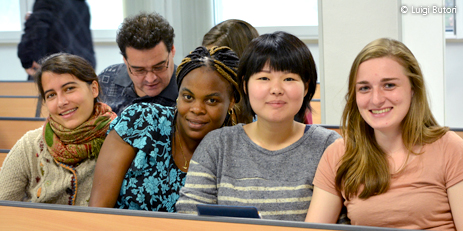
Jan 28, 2016 | Non categorizzato
 Sophia University Institute and the insertion of its graduates in the employment world: a more or less difficult relationship with respect to other academic programs? Eight years after the inauguration of the Sophia University Institute (SUI), the Italian professor of Social Research Methodology, performed a survey starting from these interrogatives. Some observations taken from the survey. The survey sample consisted in the first 80 SUI graduates, those who attended and concluded a two-year course with the achievement of a degree within the year 2014. In the first two months of 2015 this group was asked to respond to a semi-structured questionnaire, drafted to get some essential information on the professional pathways and lifestyles undertaken after their studies in Sophia. Out of a total of young graduates 61 gave their response (75% out of the total) coming from 30 different countries; their collaboration enabled to focus on the value their studies in Sophia played in their quest for a job. Above all the study programme concluded in the foreseen period of two years in 91% of the sample; 81% found a job within six months, and 96% within a year. Today 51% of the degree holders have a stable job, 26% have a temporary job; 62% of the cases have a full-time job, and 26% work part time, while for 13% have a second job. Most of the graduates (63%) are assigned roles of responsibility in companies, public administrations, universities and in other cultural, non-profit agencies: 28% are freelance professionals, entrepreneurs, consultants; 7% are top directors and managers, and 28% work in the field of scientific-cultural education and research. Effectiveness of the educational program, compared to the actual job placement seems to have been confirmed: more than two-thirds of the graduates (68%) think that the SUI programme offered is aligned with the job they now hold. This effectiveness is set in relation to some specific transverse skills the graduates retain to have achieved or strengthened during their studies in Sophia. They mention in particular the capacity to interact in a “plural” context under the cultural and disciplinary profile , and problem-solving skills through the integration of different perspectives and competences, and managing situation of conflict, working in synergy in with other social and cultural players, promoting innovative solutions. To note, lastly, that none of the graduates regretted having undertaken the chosen pathway: 72% would willing redo the course as is, while 28% would redo it and suggest some changes. Among these, they highlighted the lack of apprenticeship and internship available in the two-year programme, a priority targeted by the Institute’s competent Offices. “The analysis of the strong points is very interesting,” Licia Paglione commented, “above all studying at Sophia meant getting involved in a programme of discovery and maturation of one’s own relational identity, a pathway that includes and upholds intellectual resources and at the same time imbues the psychological, affective, spiritual and operational dimensions and urges each toward commitment.”
Sophia University Institute and the insertion of its graduates in the employment world: a more or less difficult relationship with respect to other academic programs? Eight years after the inauguration of the Sophia University Institute (SUI), the Italian professor of Social Research Methodology, performed a survey starting from these interrogatives. Some observations taken from the survey. The survey sample consisted in the first 80 SUI graduates, those who attended and concluded a two-year course with the achievement of a degree within the year 2014. In the first two months of 2015 this group was asked to respond to a semi-structured questionnaire, drafted to get some essential information on the professional pathways and lifestyles undertaken after their studies in Sophia. Out of a total of young graduates 61 gave their response (75% out of the total) coming from 30 different countries; their collaboration enabled to focus on the value their studies in Sophia played in their quest for a job. Above all the study programme concluded in the foreseen period of two years in 91% of the sample; 81% found a job within six months, and 96% within a year. Today 51% of the degree holders have a stable job, 26% have a temporary job; 62% of the cases have a full-time job, and 26% work part time, while for 13% have a second job. Most of the graduates (63%) are assigned roles of responsibility in companies, public administrations, universities and in other cultural, non-profit agencies: 28% are freelance professionals, entrepreneurs, consultants; 7% are top directors and managers, and 28% work in the field of scientific-cultural education and research. Effectiveness of the educational program, compared to the actual job placement seems to have been confirmed: more than two-thirds of the graduates (68%) think that the SUI programme offered is aligned with the job they now hold. This effectiveness is set in relation to some specific transverse skills the graduates retain to have achieved or strengthened during their studies in Sophia. They mention in particular the capacity to interact in a “plural” context under the cultural and disciplinary profile , and problem-solving skills through the integration of different perspectives and competences, and managing situation of conflict, working in synergy in with other social and cultural players, promoting innovative solutions. To note, lastly, that none of the graduates regretted having undertaken the chosen pathway: 72% would willing redo the course as is, while 28% would redo it and suggest some changes. Among these, they highlighted the lack of apprenticeship and internship available in the two-year programme, a priority targeted by the Institute’s competent Offices. “The analysis of the strong points is very interesting,” Licia Paglione commented, “above all studying at Sophia meant getting involved in a programme of discovery and maturation of one’s own relational identity, a pathway that includes and upholds intellectual resources and at the same time imbues the psychological, affective, spiritual and operational dimensions and urges each toward commitment.”
Jan 27, 2016 | Non categorizzato, Word of
[soundcloud url=”https://soundcloud.com/user-958772872/word-of-life-february-2016″ params=”color=ff5500&auto_play=false&hide_related&visual=false&show_comments=true&show_user=true&show_reposts=false” width=”100%” height=”166″ iframe=”true” /]
This Word of Life is an invitation to believe in God’s loving action even where his presence is not felt. It is a proclamation of hope and challenge that we too might we become instruments of consolation. Who hasn’t seen a crying child throw itself into its mother’s arms? Whatever the matter is, important or not, the mother dries its tears, covers it with tenderness and, bit by bit, it starts to smile again. Her presence and loving kindness are enough. God behaves like this with us, and compares himself to a mother. These words are how God speaks to his people on their return from exile in Babylon. They had seen their homes and the Temple demolished and had been deported to a foreign land where they felt lost and grief-stricken; now, returning to their homeland, the people had to rebuild from the rubble of destruction. The tragedy Israel had lived through is repeated by many war-torn peoples, victims of terrorist atrocities or inhuman exploitation. Houses and streets ripped apart, sites symbolic of a cultural identity razed to the ground, goods pillaged, places of worship destroyed. How many people kidnapped, millions forced to flee, thousands dying in deserts or at sea! It looks like an apocalypse. This Word of Life is an invitation to believe in God’s loving action also where his presence is not felt. It is a proclamation of hope. He is beside the one who suffers persecution, injustice, exile.
He is with us, with our family, with our people. He knows our personal pain and that of the whole human race. He became one of us, to the point of dying on a cross. This is why he knows how to understand us and comfort us. Just like a mother who takes her child onto her lap and comforts it. We need to open our eyes and hearts to ‘see him’. To the extent that we experience the tenderness of his love, we will be able to transmit it to those who live in pain and under trial, so that we become instruments of consolation. Paul, too, suggests it to the Corinthians: ‘console those who are in any affliction with the consolation with which we ourselves are consoled by God’ (2 Cor. 1:4).
This was also a deeply personal and specific experience of Chiara Lubich: ‘Lord, give me all who are lonely … I have felt in my heart the passion that fills your heart for all of the forsakenness in which the whole of the world is drifting. I love everyone who is sick and alone. Who consoles their weeping? Who mourns their slow death? Who presses to their own heart, the heart in despair? My God, let me be in this world the tangible sacrament of your love; let me be your arms that press to themselves and consume in love all the loneliness of the world.’ 1
Edited by Fabio Ciardi
This Word of Life was chosen by an ecumenical group in Germany. We are living it together with brothers and sisters from many different Churches. Our hope is that our lives throughout the year may be accompanied by the promise from God that it contains. 1 Chiara Lubich, Meditations (London : New City, 2005), 24
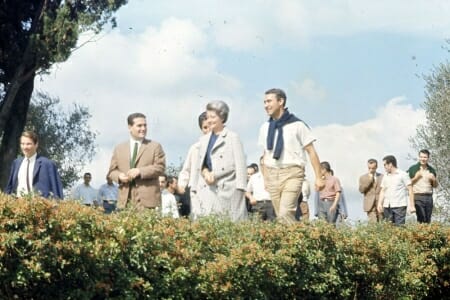
Jan 27, 2016 | Non categorizzato
Following the request put by the Focolare Movement on 7th December 2013 to the Rt Rev. Raffaello Martinelli, Bishop of Frascati, on 27th January last year Chiara Lubich’s cause of Beatification was opened. “Our only wish is to offer the Church and humankind the gift that Chiara was for us and for a vast number of people” said Maria Voce, President of the Focolare Movement on that occasion. “Receiving the charism God gave her … Chiara worked so that this pathway of Gospel life could be followed by many people. She always renewed her determination to help all those she met to put God in the first place in their lives and to “become saints together”. Her vision and her heart were motivated by a universal love which was able to embrace all people, going beyond all differences, and always directed towards fulfilling the testament of Jesus: “May they all be one”.
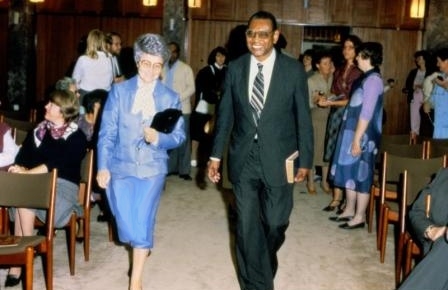
1982: Chiara Lubich with Philip Potter at the World Council of Churches (WCC)
 We too have a path. … For us it is God’s will to walk along a collective pathway to holiness. To do so we need to keep in mind two aspects of our spirituality which we cannot do without. We cannot become saints if the Risen Lord is not living in us and among us. We are in the midst of the world and whichever way we turn we find something that is in contradiction to Christ and his way of thinking. In the world there is an atmosphere of consumerism, hedonism, materialism and secularism everywhere. How can we bring the presence of God effectively and constantly into today’s society more and more? How can we avoid the world’s snares? How can we stick to the decisions we make in moments of grace? Our Lady has given us a great way of doing this in her Work. She has built up everywhere, in different ways, smaller or larger communities whose vocation it is to keep Jesus present in their midst. This means, therefore, not only overcoming personal problems by embracing Jesus Forsaken so that the Risen Lord can live in us, but it also means building unity with our brothers and sisters so that the Risen Lord can be in our midst. She knows that on our own, in a world like ours, it would be difficult to manage. For that reason she “invented” this spirituality which is called collective, precisely because it is lived by many people together …».
We too have a path. … For us it is God’s will to walk along a collective pathway to holiness. To do so we need to keep in mind two aspects of our spirituality which we cannot do without. We cannot become saints if the Risen Lord is not living in us and among us. We are in the midst of the world and whichever way we turn we find something that is in contradiction to Christ and his way of thinking. In the world there is an atmosphere of consumerism, hedonism, materialism and secularism everywhere. How can we bring the presence of God effectively and constantly into today’s society more and more? How can we avoid the world’s snares? How can we stick to the decisions we make in moments of grace? Our Lady has given us a great way of doing this in her Work. She has built up everywhere, in different ways, smaller or larger communities whose vocation it is to keep Jesus present in their midst. This means, therefore, not only overcoming personal problems by embracing Jesus Forsaken so that the Risen Lord can live in us, but it also means building unity with our brothers and sisters so that the Risen Lord can be in our midst. She knows that on our own, in a world like ours, it would be difficult to manage. For that reason she “invented” this spirituality which is called collective, precisely because it is lived by many people together …».
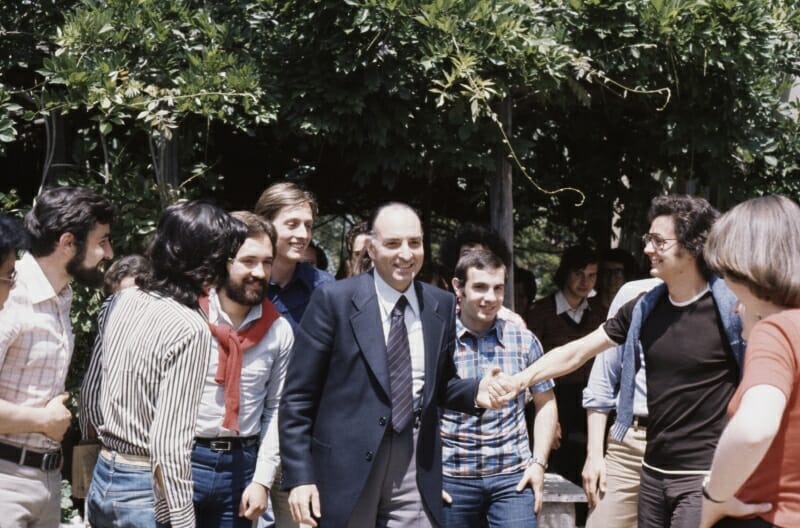
Jan 24, 2016 | Non categorizzato
 “Among Christians there is an experience that is similar to married life. Inevitably difficulties between the couple arise. Only if there is love these difficulties serve to maintain love and enable unity to grow among them. When love is absent, problems become an insurmountable obstacle and they are given as an excuse in the event of a separation. But in reality it is not the problems that have destroyed the family, but the lack of love. So it is between the Churches. The division happened not only because of religious or theological differences, but also – and at times foremost – because of political, economic or cultural motives. In the measure that love grows, disunity becomes unbearable and problems are overcome. I think that one day the various Churches, without abandoning their own traditions and legitimate expressions that have developed throughout history, can participate together, when God wills, in a Council that will unite them and which will ensure that the Church, while being one, retains many of these expressions. The time is perhaps premature, but in a single day God can make us live a thousand years. It will be an event which will have a profound impact on all members of the great religions.” From “COLLOQUI” – Pasquale Foresi – Città Nuova 2009 – pp. 155-156-161
“Among Christians there is an experience that is similar to married life. Inevitably difficulties between the couple arise. Only if there is love these difficulties serve to maintain love and enable unity to grow among them. When love is absent, problems become an insurmountable obstacle and they are given as an excuse in the event of a separation. But in reality it is not the problems that have destroyed the family, but the lack of love. So it is between the Churches. The division happened not only because of religious or theological differences, but also – and at times foremost – because of political, economic or cultural motives. In the measure that love grows, disunity becomes unbearable and problems are overcome. I think that one day the various Churches, without abandoning their own traditions and legitimate expressions that have developed throughout history, can participate together, when God wills, in a Council that will unite them and which will ensure that the Church, while being one, retains many of these expressions. The time is perhaps premature, but in a single day God can make us live a thousand years. It will be an event which will have a profound impact on all members of the great religions.” From “COLLOQUI” – Pasquale Foresi – Città Nuova 2009 – pp. 155-156-161
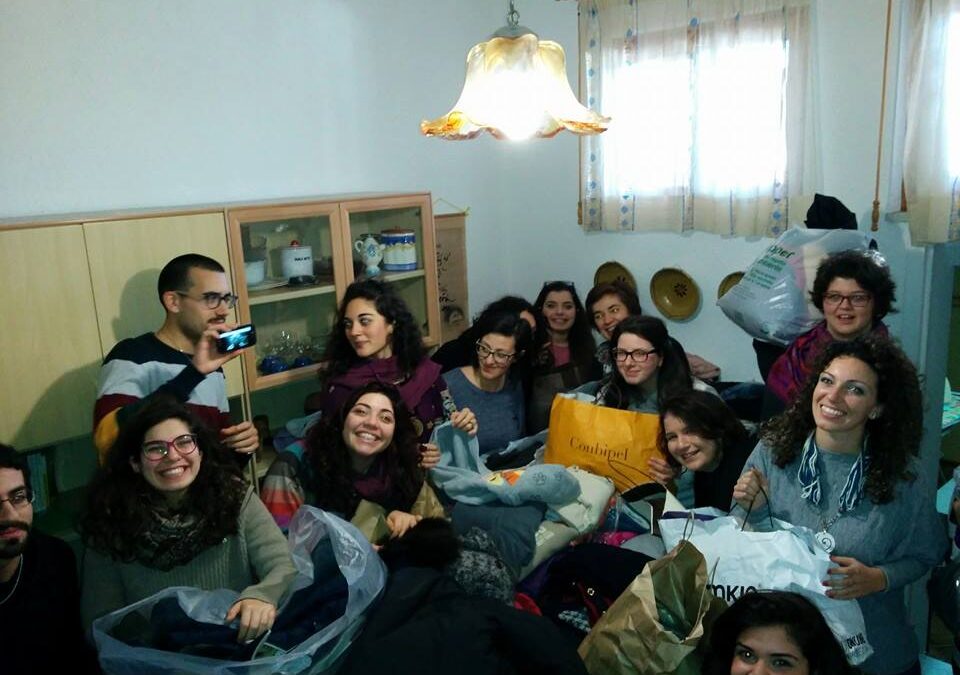
Jan 21, 2016 | Non categorizzato
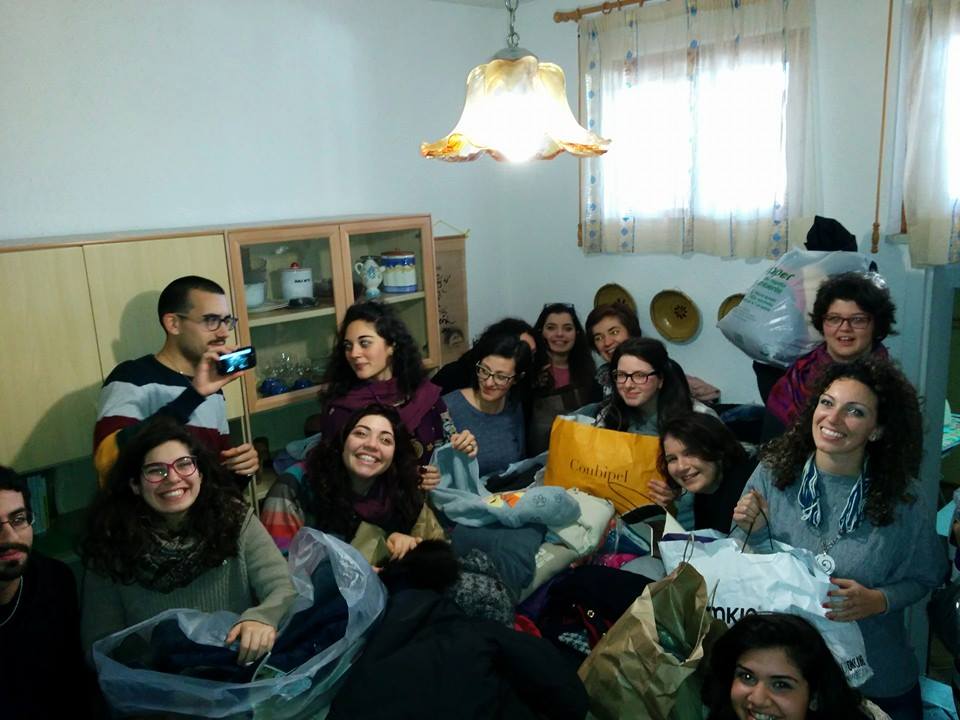 “One of our Focolare contacts living on the border with Syria, has made us aware of the critical situation they’re currently undergoing. With the onset of Winter in Syria there is urgent need for heating and appropriate clothing to withstand the low temperatures. The people there are unable to buy these types of clothes because of economic difficulties but also because of the embargo on importation of these types of items. Speaking about this in our group, we understood that we needed to immediately do something to help these brothers and sisters of ours. Through a Facebook page which keeps all the young people of the Focolare in Italy connected, we launched this appeal which is being spread via the hashtag #riscaldiamolasiria. The most immediate solution to meet their needs was to ship a package with appropriate clothing. The action started with all of us going through our wardrobes and organising collection points throughout Italy to collect the items. The generosity was overwhelming! With the help also of other members of the Focolare Movement in different local communities, many parcels were dispatched within a few days and are already reaching Syria. At first our enthusiasm was somewhat dampened because of the high shipping costs, but through our communications network across Italy in real time, we were able to find the most secure transport with the cheapest rates. The help that we’re giving will not stop here; we will continue to support them in a practical way with every means at our disposal! For now we’re sending the items to those in need in Syria, and any items left over will be given to those most in need in our city.” Maria Chiara De Lorenzo
“One of our Focolare contacts living on the border with Syria, has made us aware of the critical situation they’re currently undergoing. With the onset of Winter in Syria there is urgent need for heating and appropriate clothing to withstand the low temperatures. The people there are unable to buy these types of clothes because of economic difficulties but also because of the embargo on importation of these types of items. Speaking about this in our group, we understood that we needed to immediately do something to help these brothers and sisters of ours. Through a Facebook page which keeps all the young people of the Focolare in Italy connected, we launched this appeal which is being spread via the hashtag #riscaldiamolasiria. The most immediate solution to meet their needs was to ship a package with appropriate clothing. The action started with all of us going through our wardrobes and organising collection points throughout Italy to collect the items. The generosity was overwhelming! With the help also of other members of the Focolare Movement in different local communities, many parcels were dispatched within a few days and are already reaching Syria. At first our enthusiasm was somewhat dampened because of the high shipping costs, but through our communications network across Italy in real time, we were able to find the most secure transport with the cheapest rates. The help that we’re giving will not stop here; we will continue to support them in a practical way with every means at our disposal! For now we’re sending the items to those in need in Syria, and any items left over will be given to those most in need in our city.” Maria Chiara De Lorenzo
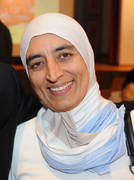
Jan 20, 2016 | Non categorizzato
 The reasons for the award is in recognition for the work of the physician, Dr Noorjehan Abdul Majid, and the work of the Sant’Egidio community, in the fight against AIDS. Dr Abdul Majid’s ability as a Muslim woman to build exceptional bridges between Christians and Muslims, demonstrate that through the promotion of a peaceful co-existence it’s possible for there to be effective collaboration between Christians and Muslims. Among those who will be present at the ceremony are Annette Schavan, the German ambassador to the Holy See, who will deliver the oration. The award is in memory of the person and spiritual heritage of Catholic bishop of Aachen, Klaus Hemmerle (1929 – 1994). The Focolare Movement gives these awards to outstanding “bridge builders” of dialogue between churches, religions and visions of the world. The prize is awarded every two years. See also: www.fokolar-bewegung.de Sant’Egidio’s DREAM public health project
The reasons for the award is in recognition for the work of the physician, Dr Noorjehan Abdul Majid, and the work of the Sant’Egidio community, in the fight against AIDS. Dr Abdul Majid’s ability as a Muslim woman to build exceptional bridges between Christians and Muslims, demonstrate that through the promotion of a peaceful co-existence it’s possible for there to be effective collaboration between Christians and Muslims. Among those who will be present at the ceremony are Annette Schavan, the German ambassador to the Holy See, who will deliver the oration. The award is in memory of the person and spiritual heritage of Catholic bishop of Aachen, Klaus Hemmerle (1929 – 1994). The Focolare Movement gives these awards to outstanding “bridge builders” of dialogue between churches, religions and visions of the world. The prize is awarded every two years. See also: www.fokolar-bewegung.de Sant’Egidio’s DREAM public health project

 Sophia University Institute and the insertion of its graduates in the employment world: a more or less difficult relationship with respect to other academic programs? Eight years after the inauguration of the Sophia University Institute (SUI), the Italian professor of Social Research Methodology, performed a survey starting from these interrogatives. Some observations taken from the survey. The survey sample consisted in the first 80 SUI graduates, those who attended and concluded a two-year course with the achievement of a degree within the year 2014. In the first two months of 2015 this group was asked to respond to a semi-structured questionnaire, drafted to get some essential information on the professional pathways and lifestyles undertaken after their studies in Sophia. Out of a total of young graduates 61 gave their response (75% out of the total) coming from 30 different countries; their collaboration enabled to focus on the value their studies in Sophia played in their quest for a job. Above all the study programme concluded in the foreseen period of two years in 91% of the sample; 81% found a job within six months, and 96% within a year. Today 51% of the degree holders have a stable job, 26% have a temporary job; 62% of the cases have a full-time job, and 26% work part time, while for 13% have a second job. Most of the graduates (63%) are assigned roles of responsibility in companies, public administrations, universities and in other cultural, non-profit agencies: 28% are freelance professionals, entrepreneurs, consultants; 7% are top directors and managers, and 28% work in the field of scientific-cultural education and research. Effectiveness of the educational program, compared to the actual job placement seems to have been confirmed: more than two-thirds of the graduates (68%) think that the SUI programme offered is aligned with the job they now hold. This effectiveness is set in relation to some specific transverse skills the graduates retain to have achieved or strengthened during their studies in Sophia. They mention in particular the capacity to interact in a “plural” context under the cultural and disciplinary profile , and problem-solving skills through the integration of different perspectives and competences, and managing situation of conflict, working in synergy in with other social and cultural players, promoting innovative solutions. To note, lastly, that none of the graduates regretted having undertaken the chosen pathway: 72% would willing redo the course as is, while 28% would redo it and suggest some changes. Among these, they highlighted the lack of apprenticeship and internship available in the two-year programme, a priority targeted by the Institute’s competent Offices. “The analysis of the strong points is very interesting,” Licia Paglione commented, “above all studying at Sophia meant getting involved in a programme of discovery and maturation of one’s own relational identity, a pathway that includes and upholds intellectual resources and at the same time imbues the psychological, affective, spiritual and operational dimensions and urges each toward commitment.”
Sophia University Institute and the insertion of its graduates in the employment world: a more or less difficult relationship with respect to other academic programs? Eight years after the inauguration of the Sophia University Institute (SUI), the Italian professor of Social Research Methodology, performed a survey starting from these interrogatives. Some observations taken from the survey. The survey sample consisted in the first 80 SUI graduates, those who attended and concluded a two-year course with the achievement of a degree within the year 2014. In the first two months of 2015 this group was asked to respond to a semi-structured questionnaire, drafted to get some essential information on the professional pathways and lifestyles undertaken after their studies in Sophia. Out of a total of young graduates 61 gave their response (75% out of the total) coming from 30 different countries; their collaboration enabled to focus on the value their studies in Sophia played in their quest for a job. Above all the study programme concluded in the foreseen period of two years in 91% of the sample; 81% found a job within six months, and 96% within a year. Today 51% of the degree holders have a stable job, 26% have a temporary job; 62% of the cases have a full-time job, and 26% work part time, while for 13% have a second job. Most of the graduates (63%) are assigned roles of responsibility in companies, public administrations, universities and in other cultural, non-profit agencies: 28% are freelance professionals, entrepreneurs, consultants; 7% are top directors and managers, and 28% work in the field of scientific-cultural education and research. Effectiveness of the educational program, compared to the actual job placement seems to have been confirmed: more than two-thirds of the graduates (68%) think that the SUI programme offered is aligned with the job they now hold. This effectiveness is set in relation to some specific transverse skills the graduates retain to have achieved or strengthened during their studies in Sophia. They mention in particular the capacity to interact in a “plural” context under the cultural and disciplinary profile , and problem-solving skills through the integration of different perspectives and competences, and managing situation of conflict, working in synergy in with other social and cultural players, promoting innovative solutions. To note, lastly, that none of the graduates regretted having undertaken the chosen pathway: 72% would willing redo the course as is, while 28% would redo it and suggest some changes. Among these, they highlighted the lack of apprenticeship and internship available in the two-year programme, a priority targeted by the Institute’s competent Offices. “The analysis of the strong points is very interesting,” Licia Paglione commented, “above all studying at Sophia meant getting involved in a programme of discovery and maturation of one’s own relational identity, a pathway that includes and upholds intellectual resources and at the same time imbues the psychological, affective, spiritual and operational dimensions and urges each toward commitment.” 





